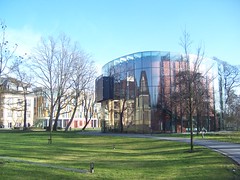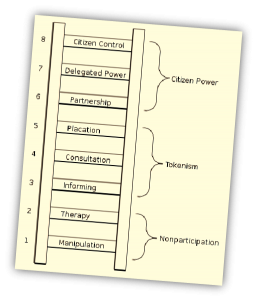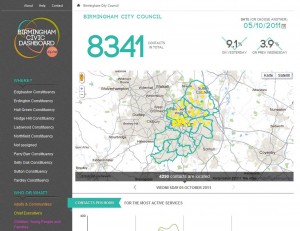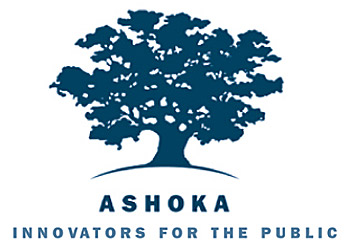Only articles in with the "inenglish" tag are displayed
To display all articles click
here.
 |
22. May 2012 – 10:09 by Asociacion Ciudades Kyosei / Pedro Prieto-Martin
|
 This week Avaaz, the “campaigning community bringing people-powered politics to decision-makers worldwide’, started the beta-testing of its community petitions platform, which allows anybody to launch a petition in a question of minutes. This new systems empowers anybody to make use of the streamlined processes and tools that have allowed Avaaz to grow its user base to more than 14.400.000.
This week Avaaz, the “campaigning community bringing people-powered politics to decision-makers worldwide’, started the beta-testing of its community petitions platform, which allows anybody to launch a petition in a question of minutes. This new systems empowers anybody to make use of the streamlined processes and tools that have allowed Avaaz to grow its user base to more than 14.400.000.
 Avaaz thus follows the recente move from change.org, the “social action platform that empowers anyone”, which just two weeks ago ‘absorved’ the Spanish platform “Actuable” and is now planning to translate its ‘petition making system’ to many other languages to really extend its reach worldwide.
Avaaz thus follows the recente move from change.org, the “social action platform that empowers anyone”, which just two weeks ago ‘absorved’ the Spanish platform “Actuable” and is now planning to translate its ‘petition making system’ to many other languages to really extend its reach worldwide.

Each of these platforms claims to have promoted petitions that forced very important political ‘actors’ to react: from Hillary Clinton to Presidente Morales, from Bank of America and Apple to Hilton Hotels.
 This is an interesting ‘tectonic’ move in the realm of (e)Participation, which we should follow closely. It is, additionally, much related to the discussion about “Sticks and Carrots” we hold in Pep-Net’s blog a year ago.
This is an interesting ‘tectonic’ move in the realm of (e)Participation, which we should follow closely. It is, additionally, much related to the discussion about “Sticks and Carrots” we hold in Pep-Net’s blog a year ago.
We were then reflecting about questions like: is it better to praise “good deeds” of Corporation and Politicians, or is it better to warn and punish them when they “misbehave”? Why not both things at the same time?
Anita Roddick, the founder of the Body Shop, reported that once an executive of Shell told her: “We don’t fear regulation, we only fear consumer revolt”
Well: it is clear now that consumer and citizens are getting better at revolting and exerting pressure. Change is happening out of anybody’s reach, and (e)Participation is slowly “getting teeth”, which soon will be able to hurt enough as to influence behaviour: if you do not want your brand reputation to get ruined… you better behave!!! And this applies to corporation as much as political actors.
The promise of a ‘Future Goverment’ that becomes FAST (flatter, agile, streamlined and tech-enabled) -which was delivered in the last World Economic Forum- starts to be truth. But, for sure, it is not government who is promoting it. It is NGOs and CSOs. It is citizens.
It is important to note that the technology behind these petition plattforms is very, very simple. The concepts and processes of use are also not sci-fiction. But for sure, this kind of powerful, sustainable and social minded (e)Participation was rarely promoted by our Governments’ Innovation Support Actions. Instead of an impact oriented eParticipation research, put at the service of Civil Society, a Government- and Academia-centred approach was preferred. And thus eParticipation has just advance by little steps.
It is a pitty, because these platforms are now out there, growing. They were created with less (or ‘no’) involvement of eParticipation researchers. And that means that we do not have easy access to the very valuable information about eParticipation that these systems are generating (about pattern and reasons of use, users’ demographics, typologies of action, success rates, etc).
We should reflect about this. We have not so many more opportunities to miss. The field is developing faster and faster. Do we want to be part of it?
Posted in good practice, ICT, inclusion, Tools, Trends, Visions | No Comments »
 |
29. March 2012 – 13:11 by John Heaven (TuTech Innovation GmbH)
|

Alenka Krek-Poplin
Having studied Surveying in Ljubljana before specialising in Geographical Information Systems through work and academic study in Austria, the US and Germany, Prof. Alenka Krek-Poplin is co-founder of Hamburg’s Digital City research group, which focuses on the application of spatial data-modelling to city planning. She writes, researches and teaches on computer-aided participation in spatial planning at the HafenCity University Hamburg.
Alenka’s work focuses on how, by adding an element of fun and enjoyment (or joy) to spatial planning, it can be made more interactive and compelling and thus increase levels of participation. Her recent article “Playful public participation in urban planning: A case study for online serious games” explores aspects such as story-telling, sketching and drawing, and digital games that have the potential to make public participation (in my words) easier and less boring.
The example she draws upon in the article, Nextcampus, was a prototype of a game that she and some of her students designed and simulated. The prototype game dealt with the suggested relocation of the University of Hamburg, which has been a hot topic in recent years.
Added to this, she has conducted several projects that explore the use of public participation through geographical information systems. One of these projects was a survey of how people use the waterways around Wilhelmsburg, an island in Hamburg’s River Elbe. Participants were asked whether they carry out certain activities and were able to draw on the map, stating where they engage in them.
The most recent example, sowillichleben.com, is a website built by students to enable them to influence the building of their halls of residence in a game-like manner. One of the ways students were able to express their wishes was to stick virtual notes on areas that represented private room, communal area, and surrounding area. So they could, for example, stick a note with “privacy” on the part representing their room, and “meet new people” on the part representing the communal areas. She has also been involved in a project that enabled citizens to plan the layout of a town square using 3D objects.
In her paper describing Nextcampus, Alenka details some of the criticism that the model attracted from some experts who were asked to evaluate it. One of these was the difficulty in distinguishing between when participants are just playing, and when they are serious about what they are suggesting. I am looking forward to discussing this point at the PEP-NET Summit because it acknowledges a part of participation that I feel we pay much too little attention to. We tend to ignore that citizens always have participated in discussions with no expectation, or even desire, of their discussions leading to some kind of result, for example talking about politics at the pub, going to events to hear about political topics but not doing anything about them, and taking part in flashmobs; but this type of not-for-real participation is essential and, I suspect, one way or another leads to a much healthier public discourse and ultimately better public decisions.
Of course the other half of the equation is what to do with the results that people mean seriously, and we will be talking about that too!
For more information about the PEP-NET Summit and to register, visit https://amiando.com/pep-net. You can also find information at https://pep-net.eu/the-pep-net-summit-out-in-the-open/
Posted in News, Trends | No Comments »
 |
14. February 2012 – 15:19 by John Heaven (TuTech Innovation GmbH)
|

Photo by karikas on Flickr.com
The PEP-NET Summit 2012 will take place on 14th May 2012 at the Bucerius Law School in Hamburg. We are looking forward to an interactive event with plenty of space for networking and discussion. Anybody who is interested in eParticipation, at all levels of experience, is invitedto attend.
With an audience of European eparticipation enthusiasts, local engaged citizens, and representatives of the City of Hamburg, the PEP-NET Summit will again be a bustling marketplace of ideas and an opportunity for participants to catch up with each other and meet new people.
The first PEP-NET Summit took place on 23rd September 2010. We heard speeches from Cisco’s Paul Johnston, Andrea di Maio from Gartner, and Anke Domscheit-Berg amongst others. The summit was moderated by Richard Wilson and speakers from across Europe had the chance to present their projects and ideas in small, informal “presentation corners”.
Please block the date in your diary and register via amiando.com/pep-net. There is no entrance fee and places will be allocated on a first come, first served basis.
We look forward to welcoming you to Hamburg!
Posted in Uncategorized | No Comments »
 |
30. January 2012 – 15:40 by John Heaven (TuTech Innovation GmbH)
|
Europeans who have felt left out in the past few weeks have now got their very own achronym to rally around. Hot on the heels of the successful campaign against SOPA (“Stop Online Piracy Act”) and PIPA (“Protect Intellectual Property Act”) comes ACTA (“Anti-Counterfeiting Trade Agreement”).
A secretly-negotiated deal to protect intellectual property would always be something for the net community to get worked up about. Following the signature of the treaty, only MEPs can block it. They are the targets of an Avaaz petition, which has just rolled over the million mark at the time of writing, imploring them not to let it through.
ACTA is an international treaty aimed at preventing trade in counterfeit goods, with implications for alleged copyright infringements on the internet. The treaty, which has attracted controversy because it was negotiated in private, has been adopted by the EU but still needs formal ratification by the EU Parliament. The provision of ACTA that is most controversial is article 27 (4):
“A Party may provide, in accordance with its laws and regulations, its competent authorities with the authority to order an online service provider to disclose expeditiously to a right holder information sufficient to identify a subscriber whose account was allegedly used for infringement, where that right holder has filed a legally sufficient claim of trademark or copyright or related rights infringement, and where such information is being sought for the purpose of protecting or enforcing those rights.”
In other words, the treaty suggests that signatory countries may want to empower their authorities to force website owners to hand over users’ details, if they are alleged to have used their account for unlawful purposes. As opponents argue, requiring service providers to divulge information about users is problematic for services that encrypt information in a way that means that they themselves cannot access it. It also means that infrastructure is put into place that can be abused for less peaceful purposes such as threatening privacy rights and freedom of expression.
Kader Arif, French MEP and rapporteur for the treaty, resigned as a result of the signing. (In case you’re wondering what a rapporteur is/does: here’s a description.) As reported in the Telegraph, Polish MPs covered their faces with masks from the political hacker group Anonymous and there have been street protests in Poland against the treaty.
Gathering around the hashtag #acta, there are already calls for street protests in other countries including Germany. Between now and June, when the vote in the Parliament is due to be held, we will find out whether net advocates in Europe will come into their own in the same way that they did in the US.
Thanks to Daniel van Lerberghe for this article’s new improved title!
Posted in News | No Comments »
 |
14. November 2011 – 23:06 by Asociacion Ciudades Kyosei / Pedro Prieto-Martin
|
The Asociación Ciudades Kyosei is a small civic organization whose aim is to foster Civic Engagement by means of ICT. It was founded in 2006 and is the oldest Spanish NGO devoted to the promotion of (e)Participation. In the last years we were researching on the field of Civic Engagement and ICT, with a special focus on Latin-America and Europe. Our work combines a critical attitude with an applied, hands-on focus, and has (1) theorized about Civic Engagement, (2) analysed the best design practices for (e)Participation systems, as well as (3) analysed the difficulties that exist to promote innovation in the ICT for Governance field. Our research has been widely recognized as refreshing and insightful.
In this PeP-NET post we would like to share a tool we have developed, “The matrix of civic implication”, whose main aim is to support the development of conceptual clarity when analyzing participatory venues and participatory initiatives. If used wisely, we think the matrix is a powerful “tool”, that goes beyond alternative models (like OECD, IAP2 or Fung’s), and should allow researchers, practitioners and the ‘man in the street’ to better understand the core dimensions of participatory activities.
The Matrix of Civic Implication
 Since Sherry Arnstein presented her “Ladder of Citizen Participation” in 1969, tens of models have been proposed with the aim to describe “participation”.
Since Sherry Arnstein presented her “Ladder of Citizen Participation” in 1969, tens of models have been proposed with the aim to describe “participation”.
The problem with these models is that they tend to be either too basic -and thus they add less value- or they are too complex and specialized, and in this case they are too cumbersome to be applied.
For this reason… a lot of confusion exist in this field.
Our matrix tries to find a pragmatic balance between usefulness and complexity, and provide a tool that is at the same time powerful, practical and easy to use. It allows practitioners and theorists to compare in a matter of minutes different Participatory experiences. The model was developed to be applied to “municipal participation” initiatives, but it can be applied to other kind of participatory experiences.
The Matrix identifies four fundamental dimensions of participatory initiatives, which be informally “visualized”, and thus make this model especially suitable for comparing initiatives:
Read the rest of this entry »
Posted in open data, Tools, Visions | 1 Comment »
 |
6. October 2011 – 18:31 by John Heaven (TuTech Innovation GmbH)
|

Birmingham Civic Dashboard screenshot
In its recent consultation document ‘Making Open Data Real’, the UK Government expresses high hopes for open data, heralding it as possibly “the most powerful lever of 21st century public policy”. Following several years of open data advocacy, activism and hack days, in the UK open data is moving towards the mainstream thanks to unanimous backing from the coalition government and the opposition.
The latest move in open data comes from Birmingham City Council, which today launched its ‘Civic Dashboard’. This is a web site publishing raw customer services data along with a slick visualisation, which was made possible by a grant that Digital Birmingham received as a result of winning a competition run by the National Endowment for Science, Technology and the Arts (NESTA).
The Civic Dashboard draws its data from the customer service centre set up as part of the Council’s Business Transformation programme. An extract of data about all customer enquiries, whether by telephone, internet or email, is recorded by the customer relationship management system and fed into the Civic Dashboard in an aggregated (anonymised) form once per day. Where the data is geocoded, it can be presented on a map to show how many contacts originate from a particular ward or constituency. You can even see which channels the enquiries come through, which shows that the Council receives far more enquiries by telephone than through other channels.
This is an important step towards bridging the gap between eGovernment and ‘weGovernment’. Coming from the Council that was heavily criticised for spending £2.8m on its website as part of its eGovernment transformation, especially by Birmingham’s vocal social media users, opening up the data that is produced in the background shows what the new infrastructure can do beyond serving up static content. Doubtless there are many more datasets that exist as a result of the transformation programme, and if these are released in the future, perhaps Brummies will feel they got a better deal out of transformation than they first thought.
This itself is quite a paradox: such a handover of control to the citizen wouldn’t have happened if it weren’t for the huge transformation programme because IT is absolutely necessary for the collection of data in a reusable form.
Read the rest of this entry »
Posted in good practice, News, open data, Trends | 1 Comment »
 |
6. September 2011 – 15:15 by John Heaven (TuTech Innovation GmbH)
|
 Nikolaus Münster is Head of Press and Public Relations at the City Council in Frankfurt/Main, Germany. I spoke to him about the city’s “Social Media Newsroom“, which gathers content from all of its social media channels and presents it on one website.
Nikolaus Münster is Head of Press and Public Relations at the City Council in Frankfurt/Main, Germany. I spoke to him about the city’s “Social Media Newsroom“, which gathers content from all of its social media channels and presents it on one website.
Nikolaus gained inspiration for the idea when he took part in a European exchange programme in 2009, completing a secondment at Birmingham City Council. That is where I met him and where he learned about Birmingham News Room. Apart from anything, I think this is a nice bit of European best practice exchange, which can often be hard to quantify. It’s also nice to see Frankfurt getting something in return for the Christmas Market that they send to Birmingham ever winter!
John Heaven (JH): What is a Social Media Newsroom?
Nikolaus Münster (NM): Our Social Media Newsroom brings together all of our social media channels on one website. The user can view this site to see news about the city on Twitter, Facebook, blogs, YouTube and other media at a glance.
We have been using these means of communication for a while now. Since 2009 we have been on Facebook, Twitter and Youtube. When we started we wanted to gain experience before actively publicising our social media presences. Now, social media are central to our communication strategy.
JH: What is the main aim of the Newsroom?
Read the rest of this entry »
Posted in good practice, Interview, News, Projects | No Comments »
 |
26. August 2011 – 14:38 by Asociacion Ciudades Kyosei / Pedro Prieto-Martin
|
 Ashoka Foundation, with the support of Google, has launched Citizen Media: A Global Innovation Competition. Well, it was launched more than one month ago, but you still have 19 days (till Sep 14th) to present a proposal.
Ashoka Foundation, with the support of Google, has launched Citizen Media: A Global Innovation Competition. Well, it was launched more than one month ago, but you still have 19 days (till Sep 14th) to present a proposal.
This competition is very related to the e-Participation field, as Ashoka considers it as linked with the fields of “Citizen participation” and “Journalism”.
Ashoka and Google are seeking innovations that will allow global citizens to have a voice and the information they need to make change. The competition welcomes solutions that work with any communication or information technologies—not just the Internet. The contest is open to solutions around the world: you ara allowed to present you entry in English, Spanish, Portuguese, French, Arabic, Thai, Indonesian, Mandarin or Japanese.
Some of the benefits mentioned for participants are:
- Connect to a global online community that supports the impact you are making, or seeking to make, on the ground.
- Gain visibility with our community and our competition partner, Google.
- Position yourself as a candidate for an Ashoka Fellowship within our News & Knowledge program.
 The prizes of the competition are:
The prizes of the competition are:
- One of four US $5,000 cash prizes in unrestricted funding to boost your project.
- Consideration for an Ashoka Fellowship—complete with a three-year living stipend, international recognition, and access to a network of systems-changing social entrepreneurs.
Have a look at the webpage of Ashoka Changemakers for more details.
PS: By the way, there is an entry for our Kyopol System. We would be more that pleased if you’d like to give us any feedback about our proposal.
Posted in calls & tender, ICT, inclusion | 1 Comment »
 |
23. August 2011 – 16:28 by John Heaven (TuTech Innovation GmbH)
|
 I just stumbled across the UK Government’s Open Public Services white paper from July, which outlines the Government’s plans for reforming public services to make them more efficient and bring them closer to citizens.
I just stumbled across the UK Government’s Open Public Services white paper from July, which outlines the Government’s plans for reforming public services to make them more efficient and bring them closer to citizens.
A short section is dedicated to the role of open data in public services (page 19, or page 21 of the PDF). Under the heading “Using data to support choice”, the primary role for open data in this paper is allowing people to compare services and enable them to make a choice on which of them to use.
On top of that, the paper mentions a “right to data”, but this appears to be limited to existing datasets that already exist in electronic form — “… when useable datasets about public service performance and funding are not being published …”. This is reinforced by the phrasing of the commitment “… we will ensure that the datasets government collects are open and accessible …”
There will be some movement on the datasets that are collected, which the paper argues should reflect the wishes of service users, i.e. the kind of information that they would wish to base their decisions on. As the paper rightly flags up, there is an issue about whether to require public sector organisations to collect standardised information, which would mean less influence for individuals but greater comparability, or allow more account to be taken of local needs.
Reading (this part of) the paper, it becomes clear that the devil is in the detail of open data: how to decide which datasets to invest money in collecting? How to respect user choice whilst maintaining comparability? And how to avoid making the whole thing hugely bureaucratic? With all the talk of more choice, meaning different service providers for the same service, and the necessity to collect data for each of these service providers to enable comparisons, there is actually another layer of granularity that the regime of National Indicators for measuring local areas’ performance didn’t require.
Posted in News, open data | No Comments »
 |
9. August 2011 – 11:26 by John Heaven (TuTech Innovation GmbH)
|
Claims that social networking tools were used to co-ordinate the London riots, which have since spread to other cities including my former home town, Birmingham, point to a new digital divide: this divide is not about online and offline, but about a divide between the Twitterati, Facebook users and users of other platforms.
Following broad-brush claims that social networks have been used to co-ordinate the rioting and plundering, Twitter users have been quick to respond, pointing to Twitter campaigns to clean up the streets following the riots. They are right, but that isn’t the end of the matter.
It turns out that the riots were co-ordinated using Blackberry smart phones, which allow anonymous, encrypted, but social, communication. Blackberries? I tend to associate Blackberries with conservative business users but I was surprised to read a BBC article last week reporting that teenagers who own smart phones prefer them. While it may seem logical that they choose Blackberry devices because of the privacy and anonymity they offer, the article suggests that privacy is more of concern to older users.
Previous concerns about the digital divide seem a little simplistic now. Previously we thought in terms of a divide between online and offline, seeing the ultimate goal as getting the “final third” online. Doubters were confronted with research that deprived youngsters, especially from ethnic minorities, were more often online than one might expect. The logical conclusion was that public services need to engage more with the online generation, usually in the form of YouTube, Twitter and Facebook. Now we find that there is a whole generation we risk ignoring because of assumptions about which social media tools they use.
When I worked for Birmingham City Council, I spent some time on a project to help heal the wounds of the riots in Lozells and Handsworth in 2005. Then, the lessons learned were that false information spread by pirate radio stations inflamed the situation, reinforcing tensions between ethnic and religious groups. Encouragingly, yesterday there was a report of Sikhs and Muslims from the area standing together to fend off the looters.
Just as things are moving on there, communication habits have moved on too. Back then, pirate radio was a blind spot and monitoring established radio stations simply couldn’t give any tip-offs about the violence. Now, the blind spot is Blackberry devices and presumably a whole host of other communication channels.
So do local authorities need to start opening channels with young Blackberry users, as a Guardian journalist has done? I think in some cases they will have to, but will also have a difficult job in keeping a keen eye on the latest trends in communication.
It looks like digital just divided again.
https://www.guardian.co.uk/uk/blog/2011/aug/08/london-riots-blackberry-messenger
Posted in Uncategorized | 7 Comments »
 This week Avaaz, the “campaigning community bringing people-powered politics to decision-makers worldwide’, started the beta-testing of its community petitions platform, which allows anybody to launch a petition in a question of minutes. This new systems empowers anybody to make use of the streamlined processes and tools that have allowed Avaaz to grow its user base to more than 14.400.000.
This week Avaaz, the “campaigning community bringing people-powered politics to decision-makers worldwide’, started the beta-testing of its community petitions platform, which allows anybody to launch a petition in a question of minutes. This new systems empowers anybody to make use of the streamlined processes and tools that have allowed Avaaz to grow its user base to more than 14.400.000. Avaaz thus follows the recente move from change.org, the “social action platform that empowers anyone”, which just two weeks ago ‘absorved’ the Spanish platform “Actuable” and is now planning to translate its ‘petition making system’ to many other languages to really extend its reach worldwide.
Avaaz thus follows the recente move from change.org, the “social action platform that empowers anyone”, which just two weeks ago ‘absorved’ the Spanish platform “Actuable” and is now planning to translate its ‘petition making system’ to many other languages to really extend its reach worldwide. This is an interesting ‘tectonic’ move in the realm of (e)Participation, which we should follow closely. It is, additionally, much related to the discussion about “Sticks and Carrots” we hold in Pep-Net’s blog a year ago.
This is an interesting ‘tectonic’ move in the realm of (e)Participation, which we should follow closely. It is, additionally, much related to the discussion about “Sticks and Carrots” we hold in Pep-Net’s blog a year ago.





 Nikolaus Münster is Head of Press and Public Relations at the City Council in Frankfurt/Main, Germany. I spoke to him about the city’s “Social Media Newsroom“, which gathers content from all of its social media channels and presents it on one website.
Nikolaus Münster is Head of Press and Public Relations at the City Council in Frankfurt/Main, Germany. I spoke to him about the city’s “Social Media Newsroom“, which gathers content from all of its social media channels and presents it on one website.








